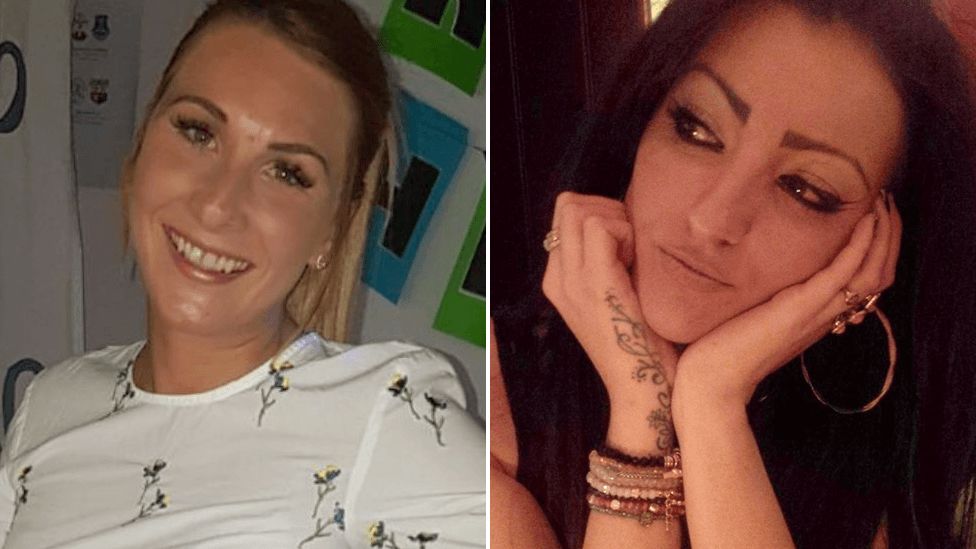
Samantha Mulcahy (left) and Kimberley Sampson died weeks apart after being operated on by the same surgeon
By Michael Buchanan, Judith Burns & Tanya Gupta
BBC News
A coroner has criticised an NHS trust after the deaths of two mothers from herpes and said antiviral drugs should have been given sooner in one case.
Kim Sampson, 29, and Samantha Mulcahy, 32, died six weeks apart in 2018 after having Caesarean sections in hospitals run by East Kent Hospitals trust.
A coroner found that a surgeon who had operated on both women was unlikely to have been the source of the infection.
She said this was in part because the NHS trust had never tested him.
The same obstetrician carried out their Caesareans seven weeks apart, the inquest has heard.
Mid Kent and Medway coroner, Catherine Wood told the inquest in Maidstone: “There is no evidence at all… that one member of the team infected both mothers.”
However, she noted the doctor and another member of the team who treated both mothers were never tested for the virus.
Ms Sampson’s baby boy was delivered at the Queen Elizabeth the Queen Mother Hospital in Margate in May 2018. In July that year, first-time mother Ms Mulcahy died from an infection caused by the same virus at the William Harvey Hospital in Ashford.
Both women had their babies delivered at hospitals run by the East Kent NHS trust
Ms Woods said that when, Ms Sampson’s condition was not responding to antibiotics, the possibility of a viral infection should have been considered earlier.
When Ms Mulcahy became ill six weeks later, medical teams were aware of Ms Sampson’s death but did not start antiviral treatment at an early stage because the cause of her symptoms were not clear.
The inquest has heard how Ms Sampson needed a blood transfusion because of injuries sustained during the operation. After two days, she asked to be discharged with her baby and went home with her mother despite being in a lot of pain.
Her condition deteriorated and she was readmitted to the maternity ward a few days later. Doctors thought she was suffering from bacterial sepsis, a potentially very serious condition, and treated her with antibiotics.
She was transferred to King’s College Hospital in south London but her condition did not improve and she died on 22 May.
Ms Mulcahy had her baby by Caesarean section on 26 June and developed a fever the following day – she was given antibiotics but did not improve.
Doctors again thought she was suffering from sepsis and on 30 June she was transferred to intensive care, but medical teams were unable to save her and she died on the morning of 4 July.
Ms Mulcahy’s mother Nicola Foster said members of the trust had behaved as if they were untouchable
The coroner said deaths from herpes were incredibly rare. The virus, HSV-1 or herpes simplex is a common infection that can cause sores around the mouth or genitals, but if contracted after giving birth, it is “a potentially fatal disease” Ms Woods said.
She said she would be writing to the Royal College of Obstetrics and Gynaecology to highlight the dangers of the condition in new mothers.
She subsequently ruled out conclusions of unlawful killing and neglect, which lawyers for the women’s families had argued for. The coroner is expected to give narrative conclusions for both Ms Sampson and Ms Mulcahy on 26 July.
Scrubbed and gloved
Speaking after the inquest, Ms Mulcahy’s mother, Nicola Foster, said: “The trust have been untruthful, dismissive, and members of the trust staff, including surgeons, doctors have behaved arrogantly, defensively, as if they are untouchable.
“Both families will always believe that the deaths of Kim and Sam were because of something they acquired whilst in hospital and we have no reason to believe otherwise.”
Yvette Sampson said her five-year fight for answers had left her unable to grieve
Ms Sampson’s mother Yvette said her fight for answers, which has now been going on for five years, has left her unable to grieve properly.
She said: “It’s consumed my life… It’s been emotionally draining. It’s changed me as a person. I’m a lot less trusting and still find it hard to comprehend how the hospital trust has acted in the way it has.”
A spokeswoman for East Kent Hospitals NHS said: “We would like to express our sincere condolences to the families of Samantha Mulcahy and Kimberley Sampson. We are unable to comment further until the inquest has concluded.”
In March, the coroner accepted an application from the NHS trust to give anonymity to the surgeon common to both cases.
The surgeon who operated on both women, who could not be named for legal reasons, previously told the hearing his hands were fully scrubbed, double gloved and he was wearing a mask during both procedures. He also said he had no lesions and was not infected but had not been tested for the virus.
Ms Wood adjourned her decision over the anonymity until the hearing on 26 July.
Follow BBC South East on Facebook, on Twitter, and on Instagram. Send your story ideas to southeasttoday@bbc.co.uk.
Related Topics
Related Internet Links
The BBC is not responsible for the content of external sites.








